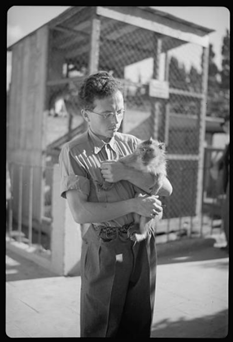At Least One Circuit Judge Thinks Denial Was Erroneous.
In Higher Taste v. City of Tacoma, Case No. C10-5252BHS (W.D. Wash. Doc. 54 filed 11/22/11), U.S. District Judge Benjamin H. Settle denied a nonprofit plaintiff’s request for attorney’s fees under the civil rights statute (42 U.S.C. § 1988(b)) after nonprofit obtained a preliminary injunction and after the parties reached a settlement in which nonprofit was allowed to distribute its shirts near a zoo despite a municipal ordinance having challenged restrictions.
Tel Aviv Zoo. Man holding monkey. Between 1934 and 1939. Library of Congress.
District Judge Settle found that his previous preliminary injunction was not one on the strict merits, but only based on a likelihood of success–expressly observing that the municipality-oriented defendants might establish the constitutionality of the ordinance on an expanded record. Once the parties settled, the preliminary injunction was dissolved. He relied on two other circuit cases denying fees where the injunction did not qualify as an enforceable judgment on the merits. (Singer v. Mngt. Consultants, Inc. v. Milgram, 650 F.3d 223, 231-32 (3d Cir. 2011); Northern Cheyenne Tribe v. Jackson, 433 F.3d 1083, 1085-1086 (8th Cir. 2006).)
Then, the next issue was whether the settlement agreement, supposedly providing everything the nonprofit sought in the litigation, led to the conclusion that it was the “prevailing party.” Not quite, because the settlement agreement was not expressly incorporated into any court judgment so that the necessary “judicial imprimatur” on the result was missing here.
However, on December 12, 2012, the nonprofit got to argue its appeal of the fee denial before the Ninth Circuit. At least one justice, Circuit Judge Paul Watford, seemed to believe that the nonprofit did prevail, getting everything they wanted through the court injunction. I guess we will have to “wait and see” a while on this one.

